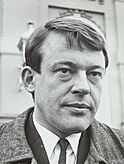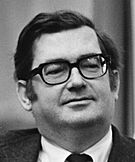Democrats 66 facts for kids
Quick facts for kids <div style="padding-top:0.3em; padding-bottom:0.3em; border-top:2px solid Lua error in Module:European_and_national_party_data/config at line 227: attempt to index field 'data' (a nil value).; border-bottom:2px solid Lua error in Module:European_and_national_party_data/config at line 227: attempt to index field 'data' (a nil value).; line-height: 1;">
Democrats 66
Democraten 66
|
|
|---|---|
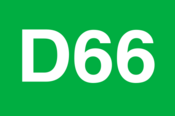 |
|
| Abbreviation | D66 |
| Leader | Rob Jetten (list) |
| Chairperson | Alexandra van Huffelen |
| Leader in the Senate | Paul van Meenen |
| Leader in the House of Representatives |
Rob Jetten |
| Leader in the EP | Gerben-Jan Gerbrandy |
| Founders | Hans van Mierlo Hans Gruijters |
| Founded | 14 October 1966 |
| Headquarters | Lange Houtstraat 11, The Hague |
| Youth wing | Young Democrats |
| Policy institute | Hans van Mierlo Foundation |
| Membership (January 2025) | |
| Ideology | |
| Political position | Centre to centre-left |
| Regional affiliation | Liberal Group |
| European affiliation | Alliance of Liberals and Democrats for Europe |
| International affiliation | Liberal International |
| European Parliament group | Renew Europe |
| Colours | <span style="background-color:Lua error in Module:European_and_national_party_data/config at line 227: attempt to index field 'data' (a nil value).; border:1px solid black;"> Green White |
| Senate | Lua error in Module:European_and_national_party_data/config at line 227: attempt to index field 'data' (a nil value). |
| House of Representatives | Lua error in Module:European_and_national_party_data/config at line 227: attempt to index field 'data' (a nil value). |
| Provincial councils |
33 / 570
<div style="background-color: Lua error in Module:European_and_national_party_data/config at line 227: attempt to index field 'data' (a nil value).; width: 6%; height: 100%;">
|
| European Parliament | Lua error in Module:European_and_national_party_data/config at line 227: attempt to index field 'data' (a nil value). |
| Benelux Parliament |
2 / 21
<div style="background-color: Lua error in Module:European_and_national_party_data/config at line 227: attempt to index field 'data' (a nil value).; width: 10%; height: 100%;">
|
| Website | |
| Lua error in Module:European_and_national_party_data/config at line 227: attempt to index field 'data' (a nil value). | |
Democrats 66, often called D66, is a political party in the Netherlands. It was founded in 1966, which is where the "66" in its name comes from. The party believes in social liberalism and progressivism. This means they support individual freedoms and rights, and they want to make society better through new ideas and reforms.
D66 is usually seen as a party that is in the middle of the political spectrum, or slightly to the left. They are part of bigger groups like the Liberal International and the Alliance of Liberals and Democrats for Europe Party (ALDE), which connect liberal parties from different countries.
When D66 first started, their main goal was to make the Dutch political system more democratic. Over time, they developed broader ideas about how society should work. In their first election in 1967, they won 7 out of 150 seats in the House of Representatives, which was a big achievement for a new party.
D66 has been part of the government several times, including from 1973 to 1977, 1981 to 1982, 1994 to 2002, 2003 to 2006, and 2017 to 2024. As of August 2025, they have nine seats in the House of Representatives, five seats in the Senate, and three seats in the European Parliament.
The party is especially popular among people who have gone to university. Many of their voters live in larger cities and wealthier areas. D66 also provides a good number of mayors, who are chosen, not elected, in the Netherlands.
The current leader of D66 is Rob Jetten. He became the party leader on 12 August 2023. Other important leaders include Paul van Meenen and Gerben-Jan Gerbrandy, who lead the party in the Senate and the European Parliament, respectively.
Party History
How D66 Started (1966–1986)
Democrats 66 was created on 14 October 1966 by a group of 44 people. Many of them were new to politics, though some had been in other parties before. The main founders were Hans van Mierlo, a journalist, and Hans Gruijters, a city council member. Van Mierlo became the party's first political leader.
The party wanted to change the old political ideas of the 19th century. They aimed to make the Dutch political system much more democratic. They also believed in making decisions based on practical solutions and scientific facts.
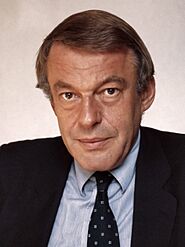
In the 1967 election, D66 won seven seats in the House of Representatives. This was a big success for a new party. In 1971, they gained four more seats. They even formed a "shadow cabinet" with the Labour Party and the Political Party of Radicals.
In the 1972 election, D66 lost some seats, ending up with six. However, they joined a group of parties called the "Progressive Agreement." This group became the largest political force in the country. After long discussions, they formed a government with other progressive politicians. Hans Gruijters became a minister in this government. After the government was formed, Van Mierlo left politics for a while. Jan Terlouw took over as the party's new leader in parliament.
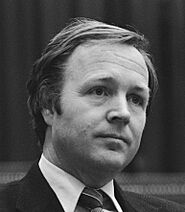
Between 1972 and 1974, D66 lost many members and did not do well in local elections. Some members even suggested getting rid of the party. But Jan Terlouw worked hard to make the party strong again. He focused on new issues like the environment and education, giving the party a more liberal direction. By 1975, their membership had doubled.
In the 1981 election, D66 won 17 seats, a big increase. They formed a government with the Labour Party and the Christian Democratic Appeal. Terlouw became the Minister of Economic Affairs. However, this government lasted only nine months because of disagreements between the main parties.
In the next election in 1982, D66 lost most of its support, ending up with only six seats. Terlouw then left politics, and Maarten Engwirda became the new leader. The party was then in the opposition, meaning they were not part of the government.
"Purple" Governments and Challenges (1986–2006)
In 1986, Hans van Mierlo returned to politics. He wanted to bring back the focus on democratic reform. He also hoped to create a government that included both the Labour Party and the VVD (a conservative liberal party), without needing the Christian Democratic Appeal.
In the 1986 election, D66 won nine seats, and in 1989, they won 12. Even though they were not in the government, D66 worked constructively with the ruling parties. This helped them in the 1994 election, where they doubled their seats to 24.
D66 then formed their desired "purple government" with the Labour Party and the VVD. This was called "purple" because it mixed the red of the Labour Party with the blue of the VVD. Van Mierlo became the Minister of Foreign Affairs. This government passed important laws, such as allowing people of the same sex to marry and regulating certain types of work. They also had successful economic policies.
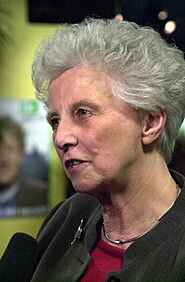
Before the 1998 election, Van Mierlo stepped down, and Minister of Health Els Borst became the new top candidate. D66 lost ten seats in this election, but the "purple government" continued. Borst became Deputy Prime Minister.
In 1999, a plan for holding referendums (where citizens vote directly on laws) was rejected. D66 temporarily left the government because of this. They returned after being promised a temporary referendum law and directly elected mayors.
In the 2002 election, D66 lost more seats, ending up with only seven. After another election in 2003, they had six seats. Boris Dittrich became the new leader. D66 then joined a government with the CDA and VVD.
In 2005, a plan for directly elected mayors was rejected again. The D66 minister responsible, Thom de Graaf, resigned. However, D66 decided to stay in the government after being promised more money for education and the environment. Alexander Pechtold took over De Graaf's role.
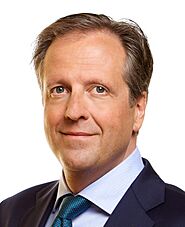
Pechtold's Leadership (2006–2018)
In February 2006, Boris Dittrich stepped down as parliamentary leader. He disagreed with the government's decision to send Dutch troops to Afghanistan. Lousewies van der Laan replaced him. In May 2006, D66 did not do well in local elections and lost many members.
In June 2006, Alexander Pechtold was chosen as the new party leader. Later that year, D66 caused the government to fall when its ministers resigned over a disagreement about a minister's actions.
In October 2006, D66 founder Hans van Mierlo questioned if the party was still relevant. However, he supported Pechtold, believing he could bring new trust to D66.
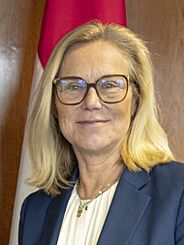
After 2008, D66 started doing much better in opinion polls. In the 2009 European Parliament election, they won 11% of the votes and three seats. Many people saw Alexander Pechtold as a strong opposition leader. Under his leadership, D66 took clear stances against other parties.
In the 2010 election, D66 increased its seats to 10, and in 2012, to 12. The party's membership also grew significantly during this time. In the 2017 election, D66 won 19 seats and joined a new government with the VVD, CDA, and Christian Union.
Kaag and Jetten's Leadership (2018–Present)
In October 2018, Alexander Pechtold announced he was leaving politics. Rob Jetten became the parliamentary leader. In September 2020, Sigrid Kaag was elected the new party leader.
In the 2021 election, D66 surprised many by winning 24 seats, becoming the second-largest party in the House of Representatives. On 12 August 2023, Rob Jetten became the leader of the party. In the 2023 election, D66 lost many seats, going from 24 to 9. They are currently in the opposition.
What D66 Believes In
The ideas of D66 are often discussed within the party itself. There are two main groups: those who focus on radical democracy and those who focus on progressive liberalism. Even though they sometimes have different views, both groups believe in the importance of individual freedom and development.
Main Ideas
Radical Democrats
When D66 first started, they strongly believed in making Dutch society and politics more democratic. They wanted to change the election system to be more like the American "first past the post" system. Over time, they changed their view to support a "mixed member proportional representation" system, which combines direct elections with a national party list to make sure all votes count fairly. This focus on democracy was combined with a practical approach to politics. Hans van Mierlo, a key figure for the party, was a strong supporter of this idea.
Progressive Liberals
Historically, the progressive liberal side of D66 was not as strong. But under Jan Terlouw in the 1970s, D66 started to focus on new issues like the environment, public education, and innovation. He saw D66 as a new type of party, different from social democrats, Christian democrats, and conservative liberals. In 2000, the party officially adopted a progressive liberal image. They use the term "social-liberal" to show they are different from the more right-leaning VVD party, which also calls itself liberal.
D66's Stances on Key Issues
Here are some of the important things D66 believes in:
- Economy: D66 supports a mixed economy. This means they believe in a balance between free markets and government involvement. They also want to make the job market more flexible and lower taxes for people with lower and middle incomes.
- Education and Innovation: They want to increase government spending on education and innovation. This includes raising teachers' salaries. D66 also wants to reduce rules in the education sector and encourage more competition.
- Environment: Protecting the environment is very important to D66. They support a carbon price (making companies pay for their carbon emissions) and investing more in sustainable energy to fight global warming. They also believe hunting should only be a last resort to control wildlife.
- Social Issues: D66 is a socially liberal party. In the past, when they were part of the government, they helped introduce laws that allowed people of the same sex to marry and regulated certain types of work.
- Democratic Reform: D66 strongly supports making democracy better. They want to change election rules, allow binding referendums, get rid of the Senate, and have direct elections for prime ministers and mayors.
Who Votes for D66
People who vote for Democrats 66 are often highly educated, and many work as civil servants. The party is strongest in the Randstad area (a large urban region in the Netherlands) and around university towns. In the 2014 local elections, D66 became the largest party in many big cities, including Amsterdam, The Hague, Utrecht, and Haarlem.
Party Structure
Name and Logo
When the party was founded, it was called Democrats '66 (D'66). The name showed their goal of making things more democratic and highlighted their modern start in 1966. In 1981, they dropped the apostrophe, becoming D66. The name had become well-known, and the year no longer needed to emphasize being modern.
How the Party Works
The most important part of D66's organization is the General Assembly. All members can attend these meetings, which happen several times a year. The Assembly chooses the party board and makes the final decisions on the party's plans. Members also directly elect the candidates for the Senate, House of Representatives, and European Parliament. D66 has between 250 and 300 local groups across the Netherlands.
Party Leaders
The party has had many leaders over the years, both for the party itself and for its groups in parliament.
Chairpersons
- Hans van Mierlo (1966–1967)
- Gerben Ringnalda (1967)
- Hans van Lookeren Campagne (1967–1968)
- Jan Beekmans (1968–1971)
- Ruby van der Scheer (1971–1973)
- Jan ten Brink (1973–1976)
- Jan Glastra van Loon (1976–1979)
- Henk Zeevalking (1979–1981)
- Cees Spigt (1981)
- Jan van Berkom (1981–1982)
- Jacob Kohnstamm (1982–1986)
- Olga Scheltema (1986)
- Saskia van der Loo (1986–1988)
- Michel Jager (1988–1990)
- Ries Jansen (1990–1992)
- Wim Vrijhoef (1992–1996)
- Tom Kok (1996–1999)
- Gerard Schouw (1999–2002)
- Alexander Pechtold (2002–2005)
- Jan Hoekema (2005)
- Frank Dales (2005–2007)
- Gerard Schouw (2007)
- Ingrid van Engelshoven (2007–2013)
- Fleur Gräper (2013–2015)
- Letty Demmers (2015–2018)
- Anne-Marie Spierings (2018–2021)
- Victor Everhardt (2021–2024)
- Alexandra van Huffelen (2024–present)
Parliamentary Leaders
- In the House of Representatives:
- Hans van Mierlo (1967–1973, 1986–1994)
- Jan Terlouw (1973–1981)
- Laurens Jan Brinkhorst (1981–1982)
- Maarten Engwirda (1982–1986)
- Gerrit Jan Wolffensperger (1994–1997)
- Thom de Graaf (1997–1998, 1998–2003)
- Els Borst (1998)
- Boris Dittrich (2003–2006)
- Lousewies van der Laan (2006)
- Alexander Pechtold (2006–2018)
- Rob Jetten (2018–2021, 2021, 2023–present)
- Sigrid Kaag (2021, 2021–2022)
- Jan Paternotte (2022–2023)
- In the Senate:
- Bert Schwarz (1971–1973)
- Paula Wassen-van Schaveren (1973–1974)
- Doeke Eisma (1974–1977)
- Jan Glastra van Loon (1980–1985)
- Jan Vis (1985–1995)
- Eddy Schuyer (1995–2007)
- Gerard Schouw (2007–2010)
- Hans Engels (2010–2011, 2018–2019)
- Roger van Boxtel (2011–2015)
- Thom de Graaf (2015–2018)
- Annelien Bredenoord (2019–2023)
- Paul van Meenen (2023–present)
Other Groups Connected to D66
The youth wing of D66 is called the Young Democrats (JD). Many important D66 members started in the JD. The JD is also part of larger international youth groups.
D66 helped create the Netherlands Institute for Multiparty Democracy, which helps support democracy in other countries. The Hans van Mierlo Foundation is the party's "think tank," where they develop new ideas and policies.
International Connections
D66 is a member of the Liberal International and the Alliance of Liberals and Democrats for Europe Party (ALDE). These groups connect liberal parties from around the world and in Europe.
In the European Parliament
D66 members in the European Parliament are part of the Renew Europe group. Before 1979, D66's appointed members were part of the Socialist Group, then independent, and since 1989, they have been part of the liberal groups in the European Parliament.
Current members of the European Parliament from D66 (since the 2024 election) are:
- Gerben-Jan Gerbrandy, who leads the group
- Raquel Garcia Hermida-van der Walle
- Brigitte van den Berg
In the Committee of the Regions
In the European Committee of the Regions, D66 is part of the Renew Europe CoR group. This committee represents local and regional governments in Europe. D66 has one full member, Ellen van Selm, and one alternate member, Robert van Asten, for the 2020–2025 period.
Water Boards
D66 does not have its own candidates for the water board elections. Instead, they suggest that their voters support Water Natuurlijk, which is an independent, green-focused political party that deals only with water management issues.
See also
 In Spanish: Demócratas 66 para niños
In Spanish: Demócratas 66 para niños
- Liberal democracy
- Liberalism in the Netherlands
- Water Natuurlijk


